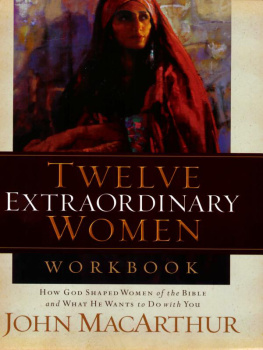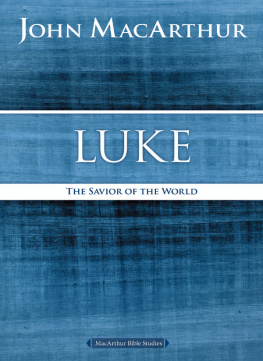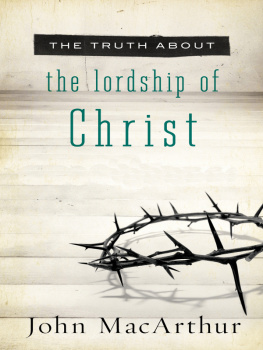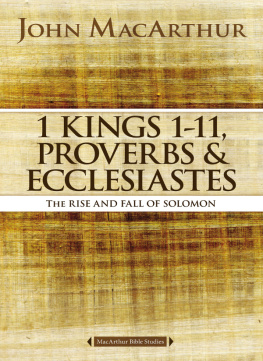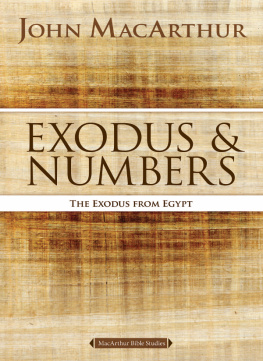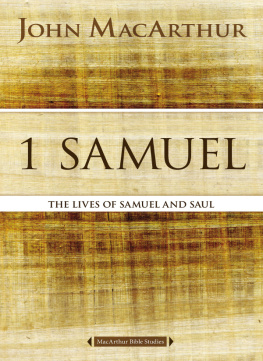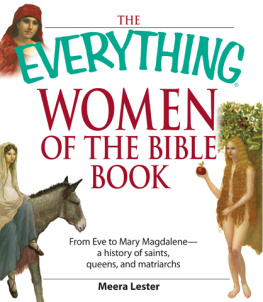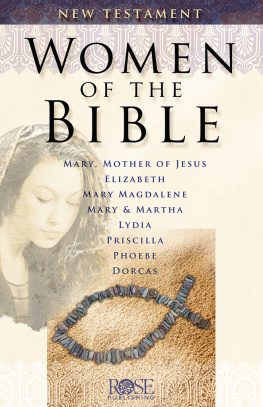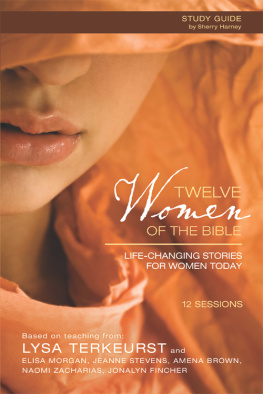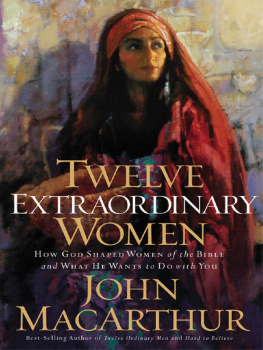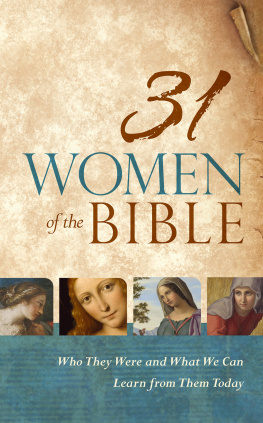TWELVE EXTRAORDINARY WOMEN
WORKBOOK

HOW GOD SHAPED WOMEN of the BIBLE,
and WHAT HE WANTS to DO with YOU
JOHN MACARTHUR

Copyright 2006 John MacArthur
All rights reserved. No portion of this book may be reproduced, stored in a retrieval system, or transmitted in any form or by any meanselectronic, mechanical, photocopy, recording, or any otherexcept for brief quotation in printed reviews, without the prior permission of the publisher.
Published by Nelson Impact, a Division of Thomas Nelson, Inc., P.O. Box 141000, Nashville, Tennessee, 37214.
Published in association with the literary agency of Wolgemuth & Associates, Inc.
All Scripture references are from The New King James Version. Copyright 1982 by Thomas Nelson, Inc. Used by permission. All rights reserved.
ISBN-10: 1-4185-0557-9
ISBN-13: 978-1-4185-0557-8
Printed in the United States of America.
06 07 08 09 10 VG 9 8 7 6 5 4 3 2 1
CONTENTS
INTRODUCTION
Ordinary or Extraordinary?
T he women chosen for the book Twelve Extraordinary Women were genuinely ordinary when it came to their human backgrounds and innate talents. In some cases, they were shockingly low-caste women or women without any particular distinction. But they were made extraordinary through memorable, life-changing encounters with the God of the universe. God used these women for His divine purposes. He refined them like silver and because of the gracious work of God, they stand as reminders to us of both our fallenness and our potential. Speaking together as one, they point us to Christ and exemplify Gods Word: God has chosen the foolish things of the world to put to shame the wise, and God has chosen the weak things of the world to put to shame the things which are mighty; and the base things of the world and the things which are despised God has chosen, and the things which are not, to bring to nothing the things that are, that no flesh should glory in His presence (1 Cor. 1:2729).
The message for today is this: as you imitate the faithfulness of these women and learn to love the Savior whose work made them extraordinary, your life also can be extraordinary.
HOW TO USE THIS COMPANION
Workbook and Study Guide
T his workbook is designed as a companion to Twelve Extraordinary Women. You are encouraged to cross-check the Scriptures used in the workbook and book, and to grapple with the passages on which the main teachings are based. The workbook serves as a directed Bible study about twelve women who lived ordinary lives with extraordinary purposes!
You may choose to use this workbook for individual or small-group study in twelve sessions. The lessons call for reflection on the Bible passages and teachings, as well as applications to everyday life.
If you are planning to use this workbook for a group study, you are encouraged to make certain each member of the group has a personal copy of the book and the workbook. At the close of each workbook chapter you will find notes and information to assist small-group leaders.
The lessons in the workbook follow this basic format:
READ
READING ASSIGNMENT
refers to the chapter in the book that is related to the lesson.
BIBLICAL FOCUS
identifies the key Bible passages associated with or included in the lesson.
REVIEW
ANOTHER LOOK
provides an opportunity for the reader to review the chapter content in the book.
BIBLE CONNECTIONS
gives an opportunity to take a direct look at Bible passages covered in the chapter.
HIGHLIGHTING THE LESSON
these questions reflect upon the central points of each chapter.
LASTING IMPLICATIONS
allows you to draw conclusions about how the chapters content relates to your personal life.
REFLECT AND RESPOND
DAILY ASSIGNMENTS
the material of the chapter is broken down into five units or sets of questions to help you apply the material in the chapter to your daily life. Each assignment includes opportunities for reflection, response, and prayer.
NOTES TO LEADERS
These notes are related to the ANOTHER LOOK section of the REVIEW questions. A person doing this study on an individual basis might check his or her responses against these notes. Additional questions are provided to prompt group discussion or to extend personal contemplation.
ADDING TO YOUR UNDERSTANDING
Also in each chapter you will find one or more set-apart segments under the heading Adding to Your Scriptural Vocabulary and Understanding. These additional comments are not directly linked to the chapter content but do relate to concepts addressed in the chapter. The segments include a question or concept for personal consideration or small-group discussion.
Adam called his wifes name Eve, because she was the mother of all living.
(GEN. 3:20)
READ
READING ASSIGNMENT
Read both the Introduction and Chapter 1 of Twelve Extraordinary Women.
BIBLICAL FOCUS
Key passages related to this section of the book: Genesis 2:2025; Genesis 3:121; and Genesis 4:1, 25.
REVIEW
ANOTHER LOOK
The following questions will help you review the material in Chapter 1.
1. If you met Eve on the first day of her creation, and then were asked to describe her to a friend, what descriptive words would you use? Choose several words and elaborate upon them if necessary.
2. What do we know about Eve from the Scripture? (List several facts.)
What dont we know about Eve? (List several items.)
3. Identify four main truths we can draw from the way in which Eve was created?
4. What is Satans modus operandi in temptation?
5. In what ways do people today try to cover the shame and guilt brought on by their sins?
6. In what ways did the curses of the serpent and Adam also impact Eve?
7. In which four areas could Eve still take comfort and hope after she had sinned?
BIBLE CONNECTIONS
These questions give you an opportunity to reflect on specific biblical passages associated with this lesson.
1. Read Genesis 2:2025. In what ways was Eves creation totally initiated and accomplished by God?
2. Read 1 Corinthians 11:39, 14; 14:3435; and 1 Timothy 2:1115. Also read Colossians 2:9 and Philippians 2:6. In what ways was woman created to be subordinate, yet equal?
3. Read Genesis 3:17. Compare to Genesis 2:1617. In what ways might we be prone to misunderstanding Gods commandments just as Eve apparently did?
4. Read Genesis 3:45. What four things did Satan promise to Eve if she would eat the fruit God had forbidden?
5. Read Romans 5:12; 1 Timothy 2:14; and Romans 5:1819. Why was it Adams failure that was so decisive for humanity, rather than Eves eating of the forbidden fruit?
6. Read Genesis 3:813. What were the three main responses Adam and Eve both had toward their sin?
7. Read James 1:1314 and 1 Timothy 2:14. Why must we take full responsibility for our own sins?
8. Read Romans 16:20; Hebrews 2:14; 1 John 3:8; and Galatians 4:4. What is the biblical understanding regarding the crushing of Satan by Jesus Christ?
HIGHLIGHTING THE LESSON
1. In your own words, how do you explain the biblical principle that Adam and Eve were two persons who were truly equal, and yet had a relationship in which Adam was the head and Eve submitted to him?
Next page
